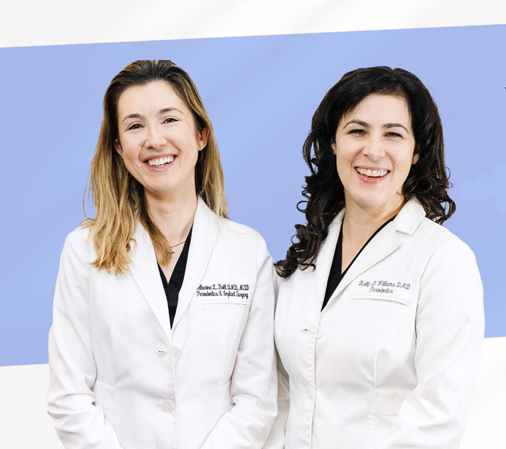 When it comes to maintaining a healthy smile, many people focus on their teeth—but healthy gums are just as important. Your gums provide the foundation for your teeth, supporting their stability and protecting them from bacteria and infection. Neglecting gum health can lead to serious oral health issues, including gum disease, tooth loss, and even complications that affect overall health.
When it comes to maintaining a healthy smile, many people focus on their teeth—but healthy gums are just as important. Your gums provide the foundation for your teeth, supporting their stability and protecting them from bacteria and infection. Neglecting gum health can lead to serious oral health issues, including gum disease, tooth loss, and even complications that affect overall health.
While general dentists play a crucial role in routine dental care, periodontists specialize in diagnosing, preventing, and treating gum-related conditions. If you have symptoms of gum disease, receding gums, or need dental implants, a periodontist can provide the advanced care you need to restore and maintain a healthy smile.
What Is a Periodontist and How Are They Different from a General Dentist?
A periodontist is a dental specialist with advanced training in the prevention, diagnosis, and treatment of gum disease and conditions affecting the supporting structures of the teeth. After completing dental school, periodontists undergo several additional years of specialized training to gain expertise in treating complex gum issues, performing surgical procedures, and placing dental implants.
While general dentists provide comprehensive oral care—including cleanings, fillings, and preventive treatments—periodontists focus specifically on gum and bone health. Some key differences between general dentists and periodontists include:
- Expertise in gum disease treatment – Periodontists diagnose and treat all stages of gum disease, from mild gingivitis to advanced periodontitis.
- Specialized surgical procedures – Treatments such as gum grafting, pocket reduction surgery, and bone regeneration are often performed by periodontists.
- Dental implant placement – Periodontists have extensive training in dental implant surgery, ensuring optimal outcomes for patients needing tooth replacement.
- Advanced knowledge of bone and soft tissue health – Since gum and bone health directly impact dental stability, periodontists are uniquely qualified to restore lost tissue and strengthen the foundation of teeth and implants.
Signs You Should See a Periodontist
Gum disease often progresses silently, meaning many people don’t realize they have it until significant damage has occurred. Recognizing the early signs of periodontal issues can help you seek treatment before the condition worsens. Consider making an appointment with a periodontist if you experience:
- Persistent bad breath – Chronic bad breath (halitosis) may be a sign of bacteria buildup beneath the gumline, indicating infection.
- Bleeding gums – If your gums bleed when you brush or floss, it may be an early sign of gingivitis, the first stage of gum disease.
- Swollen, red, or tender gums – Inflammation is a common sign of infection and gum disease progression.
- Receding gums – Gum recession can expose tooth roots, leading to sensitivity, increased decay risk, and an uneven gumline.
- Loose teeth or shifting bite alignment – Advanced gum disease can lead to bone loss, causing teeth to loosen or shift.
- Gum pain or discomfort – Pain, tenderness, or sensitivity in the gums or jawbone could be an indicator of a serious underlying issue.
- A history of gum disease or risk factors – If you have a family history of gum disease, diabetes, or smoke, you may be at higher risk for periodontal problems and should consider regular checkups with a periodontist.
Treatments Offered by a Periodontist
Periodontists provide a wide range of treatments designed to halt disease progression, restore damaged tissue, and improve overall oral health. Depending on your condition, a periodontist may recommend one or more of the following treatments:
Scaling and Root Planing
Also known as deep cleaning, this non-surgical procedure removes plaque and tartar buildup below the gumline. Smoothing the tooth roots helps prevent bacteria from accumulating and allows the gums to heal properly.
Gum Grafting
For patients with gum recession, gum grafting involves transplanting healthy tissue to the affected area. This procedure helps cover exposed tooth roots, reduce sensitivity, and restore a healthy gumline.
Pocket Reduction Surgery
In cases of advanced gum disease, bacteria can cause deep pockets to form around the teeth. Pocket reduction surgery involves carefully reducing these pockets to eliminate bacteria and prevent further bone loss.
Bone Grafting
When gum disease leads to bone deterioration, bone grafting can help restore lost bone structure. This procedure is often recommended for patients who need dental implants but have insufficient bone volume to support them.
Dental Implants
Missing teeth can affect both oral function and appearance. Periodontists specialize in placing dental implants, which provide a long-term solution for tooth loss. Implants preserve jawbone health, prevent adjacent teeth from shifting, and restore a natural-looking smile.
Guided Tissue Regeneration (GTR)
Guided Tissue Regeneration helps regenerate lost bone and gum tissue affected by periodontal disease. A special membrane guides specific cell growth, restoring tooth support, reducing gum pockets, and enhancing overall oral health.
Taking Action for Your Gum Health
Gum health plays a crucial role in maintaining a strong, healthy smile. Ignoring symptoms of gum disease or delaying treatment can lead to serious complications, including tooth loss and bone deterioration. Fortunately, with early intervention and specialized care, periodontists can help prevent further damage and restore oral health.
If you’re experiencing bleeding gums, persistent bad breath, gum recession, or loose teeth, it’s important to schedule an evaluation with a periodontist. Seeking treatment at the first sign of trouble can make all the difference in preserving your smile for years to come.
Our experienced team at Pinnacle Center Dental Implants and Periodontics is dedicated to helping you achieve optimal gum health. Contact us today to schedule a consultation and take the first step toward a healthier, more confident smile.

